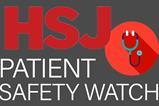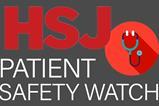HSJ hosts the Patient Safety Watch newsletter, written by Patient Safety Watch chief executive James Titcombe.
Good afternoon and welcome to the latest edition of the Patient Safety Watch newsletter.
Darzi’s diagnosis
The big news this week has been publication of Lord Darzi’s highly anticipated report on the state of the NHS.
The hard-hitting review concludes the NHS is in a “critical condition”, with long waiting times, worsening accident and emergency performance, poor access to GPs, and a lack of progress with cancer care. The review also highlights declining patient satisfaction and falling public confidence due to inefficiencies, outdated systems and a sustained lack of capital investment.
Responding to the report on Thursday, Keir Starmer pledged “the biggest reimagining of our NHS since its birth”, warning the NHS must “reform or die” and adding the findings will inform a new, 10-year plan “to radically reform the NHS and get patients treated on time again”.
Although the media has extensively covered Lord Darzi’s report, comparatively few column inches have been dedicated to what the report said about maternity safety. The report highlights “that recommendations of previous reviews have not been universally adopted”, adding that “while complexity [of births] has increased, it has occurred at a time when births have been falling and the number of midwives has risen”.
The report lists seven issues affecting maternity safety’s progress, identified by Bill Kirkup, including training in silos, poor teamwork, and blame culture. Lord Darzi concludes “too many babies and families are being let down”, adding none of the issues are insurmountable and “the first step is to acknowledge that the problems are complex and that the data suggests that adding more staff will not by itself address them”.
My view? The report provides a comprehensive diagnosis of the state of the NHS – it’s remarkable work for such a short space of time. While there will inevitably be a political element to the debate about how we got here, no one can be in any doubt about either the extent of the problems or the need for change.
The forthcoming 10-year plan is an opportunity to set us on a better path. It must be developed in partnership with patients as well as NHS staff and ensure patient safety is at the absolute forefront of its thinking.
In other news this edition…
Ombudsman reveals surge in maternity investigations
The Parliamentary and Health Service Ombudsman has revealed the number of maternity cases it investigated almost doubled from 15 to 28 between the 2023 financial year and the 2024 financial year.
PHSO Rebecca Hilsenrath said: “We know there are brilliant practitioners out there. But when maternity services fail, families are left with trauma and tragedy. The NHS needs to take steps to share good practice and change what isn’t working.”
Among the cases upheld was that of 33-year-old Carly Hardwidge, whose daughter – Seren Browne – was stillborn in 2018. Despite Ms Hardwidge raising several concerns about being unable to feel Seren move, as well as pain and blood-stained discharge, the PHSO found Royal United Hospitals Bath Foundation Trust missed several opportunities to properly investigate or refer her to an obstetrician.
Ms Hardwidge said: “For years I blamed myself. I was the one who carried her. I’m the one who was meant to keep her safe. Now I have it on paper that if I had been listened to, my daughter would be here today. Seren would be playing in the park, eating ice cream and causing chaos with her siblings. Instead, she’s at home in an urn on the shelf.”
A RUH spokesperson said the trust was “deeply sorry” and “fully accept[s]” the PHSO’s recommendations, adding: “We all strive to provide excellent and safe care for women, birthing people and their babies and when harm happens, we spend time reflecting on and learning from what we could have done differently.”
The maternity investigation statistics were released shortly after Ms Hilsenrath told The Sunday Telegraph: “There is an argument I have heard that clapping for the NHS during the pandemic was quite a dangerous thing to do… because no organisation can be a national religion, and no organisation should be beyond constructive criticism.”
Discrimination discouraging temporary staff from speaking up
An investigation by the Health Services Safety Investigation Body has found discrimination against temporary staff working in the NHS was affecting the support they received and making them feel unable to raise patient safety concerns.
Matt Mansbridge, HSSIB senior safety investigator, said: “Trusts and national organisations expressed that they are aware that many temporary staff experience discrimination and that this prevents them from talking freely. We heard from staff and agencies that the cultures and attitudes that had developed in organisations left them feeling isolated, unable to integrate with teams they are working with and feeling fearful when patient safety issues arose, or incidents occurred.
“As we found in a previous report, temporary staff have valuable insight to share and without that, opportunities for patient safety improvements could be lost, as we saw in some of the serious incident reports we analysed.”
CEOs to get ‘direct line’ to named CQC inspector
In an interview with HSJ, interim Care Quality Commission chief executive Kate Terroni said the regulator would be scrapping its “generic” inspection team model and returning to giving trust CEOs one named inspector in a bid to “build back trust”.
The move has received support from Newcastle Hospitals FT chief executive Sir Jim Mackey, who has said it will be a “helpful first step to rebuilding trust”.
However, Ms Terroni also said in the interview that she supported single-word ratings, saying the public valued them as they were a “currency which makes sense to people who use health and social care”.
More than 100 women receive compensation for vaginal mesh
The Guardian has reported that 140 women have reached an undisclosed settlement – although expected to run into the millions in total – with manufacturers Johnson & Johnson, Bard and Boston Scientific in a group action over damage caused by vaginal mesh implants.
Vaginal mesh implants have previously been used to treat prolapse and incontinence but have since been linked to complications including chronic pain.
The three companies involved confirmed to the newspaper that “the pelvic mesh claims litigation had been resolved without admission of liability”.
String of errors by mental health trust before Nottingham killings
A review into Nottinghamshire Healthcare FT has found “a series of errors, omissions and misjudgement” in its care for Valdo Calocane, who killed three people and seriously injured a further three in Nottingham in 2023.
The CQC raised various concerns about the trust’s care for Mr Calocane – who suffered from psychosis and whose medical record indicated he was “acutely unwell” – including inconsistent approaches to risk assessment, lack of engagement with his family, and a questionable decision to discharge him back to his GP.
CQC interim chief inspector of healthcare Chris Dzikiti wrote in his foreword: “For the individuals involved, their families and loved ones, the damage cannot be undone. However, there is action that can, and must, be taken to better support people with serious mental health issues and provide better protection for the public in the future.”
Nottinghamshire Healthcare chief executive Ifti Majid said: “I acknowledge and accept the findings in the report. We aim to be a learning organisation that benefits from feedback and challenges and have significantly improved processes and standards since the review was carried out.”
Sharing some good stuff…
Harmed patient pathway project out for consultation
Patient safety charity Action Against Medical Accidents and the Harmed Patient Alliance have launched a consultation on proposals for the NHS organisations to adopt a new harmed patient pathway, designed in collaboration with the Maternity and Newborn Safety Investigations programme and the charity Making Families Count, and with input from patient-safety specialists and NHS trusts.
While pathways are often used to guide providers in caring for patients with a particular diagnosis, the proposed pathway would aim to optimise recovery for patients who are suffering from the trauma of being harmed, as well as easing suffering and avoiding further distress.
The online consultation document and more information about the project are available here.
A busy week ahead!
Next week will be an important one for the patient safety community, with World Patient Safety Day taking place on 17 September. This year’s theme is focused on improving diagnosis for patient safety, using the slogan “get it right, make it safe”. On the day, patients, families, health workers, healthcare leaders, policymakers and civil society will emphasise the pivotal role of correct and timely diagnosis in improving patient safety. More information about the day with useful links and resources is available here.
And of course, the HSJ Patient Safety Congress is now almost upon us!
Taking place on September 16 and 17 in Manchester, it’s a jam-packed programme, with more than 160 expert speakers presenting and hosting honest conversations within 11 content streams, including workforce wellbeing, virtual care and AI, human factors, reducing risk, and patient safety culture.
New for this year is the addition of interactive discussion groups and workshop sessions, giving you the opportunity to collaborate and engage even more.
I’m looking forward to chairing several sessions (usual nerves and imposter syndrome aside!), including a workshop session focusing on “Responding restoratively to patient harm: unpacking the structural challenges, shared pressures and pathways to healing”, alongside some fantastic speakers such as Joanne Hughes, Allison Kooijman, and Paul Whiteing.
I hope to see many of you there. If you haven’t yet booked a place, you can still take advantage of the final discount offer available before the full price kicks in on the day – simply add the coupon code SUMMER10 at the checkout.
Before signing off a quick congratulations to two people whose work to improve healthcare safety has been recognised this week. Donna Ockenden has been awarded an honorary degree from the University of Chichester. Donna has dedicated her life to improving maternity safety and her recognition could not be more deserved.
And a huge congratulations to Mike Durkin, who has been honoured by the Patient Safety Movement Foundation, with a Lifetime Achievement Award for his lifeline dedication to advancing healthcare safety. I’m lucky enough to benefit from Mike’s kindness, wisdom and knowledge as a fellow trustee here at Patient Safety Watch. A remarkable man whose work continues to make a difference.
That brings us nearly to an end. In a week of intense scrutiny on patient safety, the need for change is clearer than ever. We have the diagnosis, but we are still searching for the cure.
Thanks all for this edition. Please look out for our next edition in two weeks’ time. In the meantime, thanks for reading and stay safe.
































No comments yet